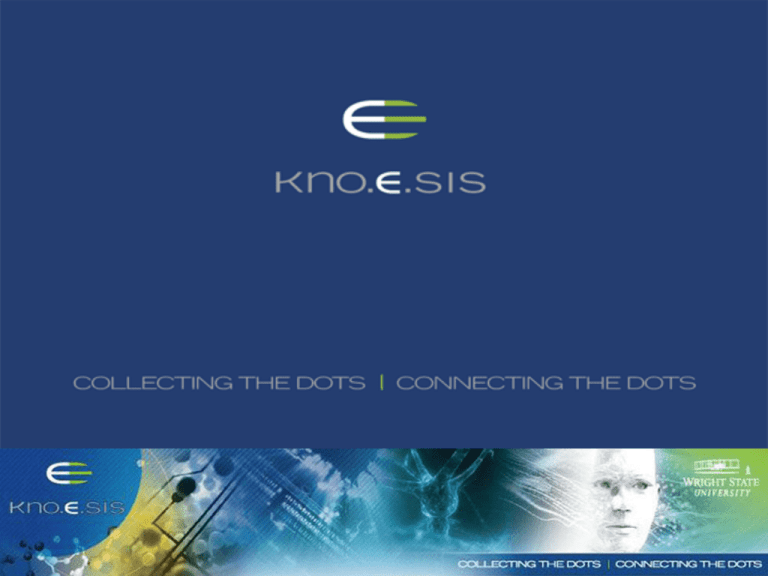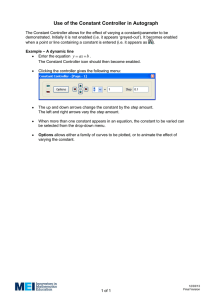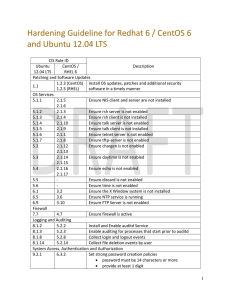AmitSheth-Chaalo-Gujarat.pptx
advertisement

Knowledge Enabled Information and Services Science This is one of the two presentations given in “The Challenges of Creating a Knowledge Society” session Dr. Amit Sheth on August 30, 2008 at the World Gujarat Conference (WCC 2008; http://www.wgc08.org), Edison, NJ, USA. The other talk was by Dr. Bakul Dholakia. Session was moderated by Jay Shah. Session Abstract: World economy was dominated by Agriculture in past. Use of mechanical devices and invention of engine reduced employment in agriculture drastically and Industrial economy became the norm. Now the Industry based economy is being transformed by Knowledge based economy though the invention of PCs & acceleration through the invention of the Internet. A new post-IT world of sunrise industries of alternative energy, bio, and nano technology are the new frontiers that will impact societies and economy. This poses a challenge, particularly, to developing country in creating and leveraging this new economy. Speakers will share their view of what it takes to create a Knowledge based Society and what is being done and should be done in Gujarat to take a quantum leap from Agricultural/Industrial/Service economy to the Knowledge based society and economy. Knowledge Enabled Information and Services Science Knowledge Enabled Information and Services Science Shift in Labor from Agriculture and Mfg to Service in Major Economies Knowledge Enabled Information and Services Science Perspectives on Measurement of Work Service systems, service scientists, SSME, and innovation P. Maglio, S. Srinivasan, J. Kreulen, J. Spohrer CACM July 2006. Knowledge Enabled Information and Services Science Next to Knowledge economy Agriculture Manufacture Service Land, seeds, Labor, Skilled labor machines, people raw material Knowledge Highly educated people who can innovate Knowledge Enabled Information and Services Science Challenges of Creating a Knowledge-based Society: Education & Research for India & Gujarat World Gujarati Conference Chaalo Gujarat, August 2008 Prof. Amit Sheth LexisNexis Ohio Eminent Scholar Wright State University, Dayton OH http://knoesis.org Knowledge Enabled Information and Services Science Proposition India and Gujarat are benefiting from Globalization, but as is the case for the West, this is a two way street. Significant challenges to gain sustainable advantage. For long term success and sustainable progress, we need a healthy mix of economic advantages (availability of capital, lower costs), entrepreneurship, favorable policies, technology, higher education and world class research. Only way to continue progress is go up the value chain from manual labor to increasingly specialized knowledge intensive tasks. Much of new capital will gravitate towards those who can innovate. What challenges Gujarat faces? What are possible solutions? Knowledge Enabled Information and Services Science Knowledge-intensive economy Growth in both manufacturing and services is driven by industries that rely heavily on the application and exploitation of knowledge. service sectors expansion driven by rapid growth of their most knowledge-intensive segments Goods from high-technology manufacturing segments represent a growing share of manufacturing output Create well-paying jobs, to contribute high-value output, and to stimulate economic activity generally Knowledge Enabled Information and Services Science “Taken together, these activities have spawned trends that are reshaping the world's S&T economy, now dominated not only by the United States and the EU, but also by selected Southeast and South Asian economies. The broad changes, generally starting in the mid-1990s and continuing unabated, have the United States holding its own in terms of (generally high) world shares, the EU-25 losing some ground, and the Asia-10 group increasing its world share. In Asia, Japan is losing world share on many indicators, while China is rapidly gaining ground, especially since the mid-1990s.” Science & Engineering Indicators2008, National Science Board http://www.nsf.gov/statistics/seind08/slides_thumb.htm#kie Knowledge Enabled Information and Services Science What happened with high technology manufacturing as part of manufacturing will happen to knowledge-intensive services as part of services Knowledge Enabled Information and Services Science India and Gujarat need to pay attention to the same issue as does USA To retain global economic leadership, “Measuring the Moment: Innovation, National Security, and Economic Competitiveness” noted: “We face strong competition from a state-managed science and technology research program in China. That draws American capital, talent, and research efforts out of the U.S. and over to China. If we are going to remain competitive, we need to focus our basic research at home and put more resources into funding it.” [Wortzel] Knowledge Enabled Information and Services Science Knowledge Enabled Information and Services Science Basic research plays a special role in developing new technologies. “Switzerland devoted almost 30% of its R&D to basic research in 2004 (figure O-27). This small, high-income country boasts the highest number of Nobel prize winners, patents, and science citations per capita worldwide and an industrial R&D share comparable with the United States and Japan. The higher Swiss basic research share reflects the concentration of chemical and pharmaceutical R&D in Swiss industrial R&D and the "niche strategy" of focusing on specialty products adopted by many Swiss high-technology industries.” In comparison, China (and India) focus on applied R&D to emphasize short term economic development. But for strategic advantage and sustainable advance, basic research component needs to increase. Knowledge Enabled Information and Services Science Emerging Economies Rapidly Increasing R&D Investments Knowledge Enabled Information and Services Science Asian Countries Building their R&D Investments Knowledge Enabled Information and Services Science China Gaining Rapidly on U.S. in High-Tech Industry Output Knowledge Enabled Information and Services Science Undergraduate Natural Science & Engineering Degrees: China on Rapid Ascent; U.S. Stagnant Knowledge Enabled Information and Services Science Population ≥15 years old with tertiary education, by country/region: 1980 Science & Engineering Indicators2008, National Science Board http://www.nsf.gov/statistics/seind08/slides_thumb.htm#kie Knowledge Enabled Information and Services Science Population ≥ 15 years old with tertiary education, by country/region: 2000 Knowledge Enabled Information and Services Science First university engineering degrees, by selected country: 1985–2005 Science & Engineering Indicators2008, National Science Board http://www.nsf.gov/statistics/sei nd08/slides_thumb.htm#kie Knowledge Enabled Information and Services Science Natural sciences and engineering doctoral degrees, by selected country: 1985– 2005 Science & Engineering Indicators2008, National Science Board http://www.nsf.gov/statistics/sei nd08/slides_thumb.htm#kie Knowledge Enabled Information and Services Science India India has seen tremendous success Stereotypical belief that the development of advanced technologies always takes place in developed countries abroad is no longer true • Ranbaxy takes leading role in collaboration with GlaxoSmithKline • Flagship products for Oracle, Adobe, and many more major companies get developed in India • R&D labs of Google, IBM, GE etc do the same class of work as their counterpart in US and home countries Knowledge Enabled Information and Services Science But Limited supply, raising cost, firming currency, competition, lack of innovation are talking toll: – at Adobe, half of its top engineers stationed in India are graduates from IIT; 70-80% of IBM Researchers got PhD from outside India, mainly US – Spiraling employee costs and the talent shortage – Ireland, Israel, Philippines, China, etc are giving tough competition – There has been little incentive or desire to innovate * B. Indira, India’s IT Sector Needs to Reboot, Asian Sentinel, Oct 17, 2007/ Knowledge Enabled Information and Services Science India's college problem: poor quality of much of India’s college education The job market for Indian college graduates is split sharply in two. With a robust handshake, a placeless accent and a confident walk, you can get a $300-a-month job with Citibank or Microsoft. With a limp handshake and a thick accent, you might peddle credit cards door to door for $2 a day. India was once divided chiefly by caste. Today, new criteria are creating a different divide: skills. Those with marketable skills are sought by a new economy of call centers and software houses; those without are ensnared in old, drudge like jobs. From http://neweconomist.blogs.com/new_economist/economy_india/index.html Based on New York Times: A College Education Without Job Prospects Knowledge Enabled Information and Services Science India's college problem: poor quality of much of India’s college education Unlike birthright, which determines caste, the skills in question are teachable. But the chance to learn such skills is still a prerogative reserved, for the most part, for the modern equivalent of India’s upper castes — the few thousand students who graduate each year from academies like the Indian Institutes of Management and the Indian Institutes of Technology. Their alumni, mostly engineers, walk the hallways of Wall Street and Silicon Valley and are stewards for some of the largest companies. From http://neweconomist.blogs.com/new_economist/economy_india/index.html Based on New York Times: A College Education Without Job Prospects Knowledge Enabled Information and Services Science India's college problem: poor quality of much of India’s college education Unlike birthright, which determines caste, the skills in question are teachable. But the chance to learn such skills is still a prerogative reserved, for the most part, for the modern equivalent of India’s upper castes — the few thousand students who graduate each year from academies like the Indian Institutes of Management and the Indian Institutes of Technology. Their alumni, mostly engineers, walk the hallways of Wall Street and Silicon Valley and are stewards for some of the largest companies. From http://neweconomist.blogs.com/new_economist/economy_india/index.html Based on New York Times: A College Education Without Job Prospects Knowledge Enabled Information and Services Science India’s college problem and outsourcing In the shadow of those marquee institutions, most of the 11 million students in India’s 18,000 colleges and universities receive starkly inferior training, heavy on obedience and light on useful job skills. It was bound to happen, but it's a remarkable story nonetheless. Thousands of jobs taken by India from the west are being re-exported as wages shoot up. From http://neweconomist.blogs.com/new_economist/economy_india/index.html Based on New York Times: A College Education Without Job Prospects Knowledge Enabled Information and Services Science Low access to Quality Higher Education India still produces plenty of engineers, nearly 400,000 a year at last count. But their competence has become the issue. Nasscom: one in four engineering graduates is employable. The best and most selective universities generate too few graduates, and new private colleges are producing graduates of uneven quality. Nilekani (Infosys): India could educate its young and open job opportunities for them, or be left with a large, potentially restive pool of unskilled, unemployable youth. “It is a golden opportunity,” he said, “which can be frittered away if we don’t do the right thing.” From http://neweconomist.blogs.com/new_economist/economy_india/index.html Based on New York Times: A College Education Without Job Prospects Knowledge Enabled Information and Services Science Outsourcing India The rise of an economic phenomenon about to engulf the world: outsourcers are outsourcing themselves. Once known for sucking jobs out of call centres and IT departments in the west, Indian technology firms are re-exporting them to wealthier nations as wage inflation and skills shortages at home reverse the process. Tata is running call centres in Britain. ABN Amro, the Dutch bank recently bought by an RBS consortium for £48bn, will pay Tata Consultancy Services $200m to send work halfway across the globe to Brazil, where software programmers will run computer systems. From http://neweconomist.blogs.com/new_economist/economy_india/index.html Based on New York Times: A College Education Without Job Prospects Knowledge Enabled Information and Services Science Likely future successful Higher Education model: China Massive Investment: – 100 Computer Sc in less than a decade, – Programs can accommodate thousands bachelors, several hundred masters, ~100 PhD students – A significant percentage of instructors educated in the US and other Western countries; – Facilities second to none Knowledge Enabled Information and Services Science Resume of a Indian applicant for US Studies (pg1) Second year, third semester student in Communication Engineering CGPA (7.447/10) EDUCATIONAL QUALIFICATIONS – Cleared IIT-JEE 2006 with All India Rank-951 among 2,60,000 candidates – Achieved 85.6% marks in Secondary School Examination, 2003 – 85% marks in Senior School Certification Examination, 2005 – Cleared REGIONAL MATEHMATICS OLYMPIAD, 2004 – Placed among 1% of all the participants in NATIONAL STANDARD EXAMINATION in PHYSICS, 2004 – Learning Java, good skills in C++ Knowledge Enabled Information and Services Science Resume of a Indian applicant for US Studies (pg2) TECHNICAL PROJECTS – Developed a site (using HTML) as a part of Software Development Section, Hobbies Club, IIT Roorkee , forexhibition in Srishti -2006, annual technical exhibition of Hobbies Club, IIT Roorkee. – Active member of Web Designing and Software Development Section, Hobbies Club, IIT Roorkee. Knowledge Enabled Information and Services Science Resume of a Chinese applicant (pg1) RESEARCH INTERESTS: Knowledge acquisition, information extraction, description logic, web reasoning EDUCATION Jilin University, Changchun, Jilin P.R. China. M.S., Computer Software and Theory (graduation: July 2009) ADVISOR: Professor Jigui Sun Knowledge Enabled Information and Services Science Resume of a Chinese applicant (pg2) AREA OF STUDY: Information Extraction, Knowledge Acquisition, Web Reasoning TECHNICAL SKILLS EXTENSIVE: • • • • • Java C and C++ Prolog Heskel and SQL ProtegeStanford NLP package •RDF •OWL •SWRL Jena2 •FaCT++ •KAON2 •Pellet •XML •KIM •MR3 •HTML parser •XML parser Knowledge Enabled Information and Services Science Resume of a Chinese applicant (pg3) Experience – Intelligent Information Processing Labs June 2006 to present – Design and implement a method to extract information from semi-structured and unstructured Web documents based on domain ontologies. Propose a method to select the outstanding patterns from the extracted patterns learned through tags and texts. Implement a tool which can do lexical analysis and morphological analysis. Design a method to merge the extracted knowledge by searching the KB. Implement an intelligent search engine based on domain ontologies for users to query the knowledge about stocks. – Intelligent Plan and Automated Reasoning Labs September 2005 to May 2006 Knowledge Enabled Information and Services Science Resume of a Chinese applicant (pg4) Publications (10) – Authors , “Domain ontology learning and consistency checking based on TSC approach and Racer". Proc. of the Intl Conf on Web Reasoning and Rule Systems (RR 2007), LNCS 2007. – Authors, “A general method of mining Chinese Web documents based on GA&SA and position-factors". 2007 Intl Workshop on High Performance Data Mining and Application in Conjunction with PAKDD07,” Springer Verlag, 2007. – “WDM: A new e±cient visualization method of classifying web documents based on SOM,” Proc. 3rd Intl. Conf. on Computational Intelligence and Security (CIS 2006), IEEE CS, 2006. – Xi Bai, Jigui Sun and Haiyan Che. “WebKER: towards wrapper learningbased knowledge extraction,” Submitted to ISWC 2007 poster and demo track. – Authors, “KEROB: extracting and querying knowledge hidden in blogs,” Submitted to IDEAL 2007. Knowledge Enabled Information and Services Science Resume of a Chinese applicant (pg5) Academic Experience Attending Asia Autumn School for Semantic Web 2007, Busan, Korea, 2007. Attending Workshop HPDMA 2007 on Conference PAKDD 2007 as an author, Nanjing, China, 2007. Attending Conference CIS 2006 as an author, Guangzhou, China, 2006. Attending Native Conference SIKIT 2006 as an author, Beijing, China, 2006. Knowledge Enabled Information and Services Science The rich parts of China, the modern parts of Beijing or Shanghai or Dalian, are now more state of the art than rich America. The buildings are architecturally more interesting, the wireless networks more sophisticated, the roads and trains more efficient and nicer. -Thomas Friedman Knowledge Enabled Information and Services Science Knowledge Enabled Information and Services Science Global R&D Race Researchers per million India: 157 China: 633 USA: 4,526 India has invested far less in science, in higher education and in research. Indian investment in science – less than 2%. Other competition 4-6%. Knowledge Enabled Information and Services Science Learning from successful Higher Education models: US BS/BE (4) + MS (2) + PhD (4-6) Many research universities (Relatively) Robust federal and state funding Faculty spend significant time in research, close involvement of students, technology transfer Well understood benefits & characteristics – MS: advanced learning: technology and skills – PhD: leadership, learning how to learn, ability to innovate and develop IP Knowledge Enabled Information and Services Science Likely future successful Higher Education model: China Robust research funding modeled on West Policy that strongly encourages international competitiveness (e.g. professors get promotion based on publications in ISI indexed journals) Knowledge Enabled Information and Services Science Higher Education in Gujarat Today: example of Information & Communication Technology • Dhirubhai Ambani Institute of Information & Communication Technology • Nirma University • IIT-B satellite, plans for IIIT Too few institutions, with too few professors: PhDs get 2-3 times more in Industry so good educators are not found. Education is mostly outdated, class room and text book centric In all of Gujarat, only DAIICT has research-oriented faculty with PhDs, engaging a handful of students in research!! Knowledge Enabled Information and Services Science What do we need? • More education leaders like Bakul Dholakia • Many more top notch educations like ???? Knowledge Enabled Information and Services Science Key opportunities & challenges Vibrant Global Gujarat Summit 2007 identified investment opportunities in: • Software development Centre • Call Centre • Business Process Outsourcing Units • Knowledge Processing Outsourcing • Training & education centre • Bio IT Software Development • Semi-conductor/Chip manufacturing Unit • Embedded software design & development • Medical Transcript Units • Graphic Animation and designing In my view we are aiming a bit low! Some of the areas are more tied to vocational school and diploma holder skills—which may be ok, but we also need to target some areas higher up the value chain!!! Knowledge Enabled Information and Services Science Key opportunities & challenges Sectors identified at Vibrantgujarat.com: Biotechnology Chemicals & Petrochemicals Engineering & Auto Food & Agri Business Gems & Jewelry Healthcare Information Technology Micro, Small & Medium Enterprises Mineral Based Industries Oil and Gas Pharmaceuticals Ports & Related Industries Power Service Sector Tourism Textiles & Apparel Urban Infrastructure Knowledge Enabled Information and Services Science What is needed to drive the growth? Policy, Capital and Educated/skilled workforce Capital is the least of the challenge and I think currently we have policy makers who can step up to the challenge. But education and workforce development requires strategic thinking and investment– something we have not done. Knowledge Enabled Information and Services Science Suggestions Continue to add to job seeking education and technical skills that help us provide outsourced services BUT Prepare for longer term, sustainable progress with Higher education and research that enables us to do built leadership and intellectual property that will –allow Gujarat/India to move up in the value chain, –be less subject to the work that can be outsourced, –get better share of what is now the start of the knowledge economy Knowledge Enabled Information and Services Science Critical ingredient If the policy makers and bureaucrats allow complete autonomy, it is possible for 1000 crores to be invested in starting new higher education institutions that can have Gujarat rival the state in the south who have done much better so far. Faculty recruitment and student admission should not have any politics or criteria beyond merit. Knowledge Enabled Information and Services Science Prescriptions …1 • Most important is the leadership by political leaders, policy makers • Attract top talent (most professor level appointments are not filled) • Give independence, make it worth while • Make it competitive – education and research are not high what Gujarati considers to be success; make research and graduate training part of faculty job requirements • Competitive research grants and study abroad • Adopt policies that require and value higher achievement (international achievement) • Start at early stage (invest in VASCSC, CSCs) Knowledge Enabled Information and Services Science However it is not so easy • How long does it take to construct a building? • How long does it take to earn a PhD? • How long does it take to train PhD’s to be effective leaders? (6 to 20 years!) • Changing culture and value system may take even longer But not doing anything is not an option Changing economy is also supposed to take much longer and yet that is happening much faster in the flat world Knowledge Enabled Information and Services Science Proposed Initiative Establish the Gujarat Graduate Research Institute to promote world class research and demonstrate a higher education and research model, which acts as a centerpiece of an intellectual center - Privately funded but facilitated by State - CM’s leadership can convince a major foundation to establish it; state can provide facilities/land in the knowledge park and facilitate regulatory approval - Get visionary leaders as directors and chairs who can achieve results; World class faculty focusing on graduate education and international quality research; academic freedom with mandate to achieve impact, competitive compensation Knowledge Enabled Information and Services Science Key opportunities & challenges Post IT market with IT as a key enabler • Energy, especially clean energy • Life Sciences including Pharmaceuticals, Biotech & Health • Logistics, shipping and transportation • Knowledge Services (my wish) incl , Web science, nano science and eng, human effectiveness, disaster mgmt and recovery Knowledge Enabled Information and Services Science Proposed Initiative (Cont’d) - Start with departments of special relevance to Gujarat’s industry and strategic importance for participation in knowledge economy - Post graduate education and research only but special focus on faculty of other institutions seeking PhD during first 5 years - Develop a model for competitive research (work with federal govt; seeded by state)- fund graduate students and faculty research - Couple with a Research Application Institute to support technology and company incubation, technology transfer and commercialization, IP management - International advisory committee Knowledge Enabled Information and Services Science What can NRGs offer • 2%: investment • What can 98% offer? (Lord Bhikhubhai Parekh) Few good men (and women, of course) Knowledge Enabled Information and Services Science What can Gujarat Diaspora do Much of what Gujarati diaspora can offer is available just asking because of the connection with “matru bhoomi” and the desire to give back –ask for advice/consultation, time and service –Get their input on policy making –develop visiting scholar exchange programs –collaboration with research universities Knowledge Enabled Information and Services Science Thank you Questions? A white paper related to this talk can be found at: http://knoesis.wright.edu/library/download/GlobalGujaratDiaspora-Sheth-Extended.pdf http://knoesis.org Knowledge Enabled Information and Services Science About the speaker Amit Sheth (http://knoesis.wright.edu/amit/) is an Educator, Researcher and Entrepreneur. He is the LexisNexis Ohio Eminent Scholar, a fellow of the Institute of Electrical and Electronics Engineers, and the director of the Knowledge enabled Information & Services Sciences (Kno.e.sis) Center in the Computer Science and Engineering department of the Wright State University, Dayton, Ohio. Earlier he was at the University of Georgia where he started the LSDIS lab in 1994 and he served in R&D groups at Bellcore, Unisys, and Honeywell. He received his BE from BITS, Pilani and his MS and PhD from the Ohio State University. Prof. Sheth’s research has led to two commercial companies which he founded and led as President/CEO, several Enterprise and Web based products and many deployed applications. His is one of the best cited authors in Computer Science (250 publications, over 14,000 citations, h-index of 55), has given over 200 invited talks and colloquia including 30+ keynotes, (co)-organized/chaired over 45 conferences/workshops, and served on over 125 program committees. He is on several journal editorial boards, and serves as Editor-in-Chief of two international journals and as series editor of two Springer book series. He is deeply interested in Gujarat's success through better higher education and research. Knowledge Enabled Information and Services Science My research – tied with Web’s evolution Web as an oracle / assistant / partner - “ask the Web” - using semantics and knowledge to leverage text + data + services + people 2007 Web of people - social networks, user-created content - GeneRIF, Connotea Web of services - data = service = data, mashups - ubiquitous computing 1997 Web of databases - dynamically generated pages - web query interfaces Web of pages - text, manually created links - extensive navigation Knowledge Enabled Information and Services Science Additional readings • • • • • • • • • Altbach: Higher education in India [To compete successfully in the knowledge-based economy of the 21st century, India needs enough universities that can support sophisticated research.] Roy: A Comparative Study of Higher Education Expansion Policy in China & India: Theory & Practice [esp. see slide 29: Strategies for Quality Improvement & Achievement (2 of 5) ] Higher Education in Developing Countries (World Bank report) Higher Education and Economic Development: India, China, and the 21st Century Kapur and Crowley: Beyond the ABCs: Higher Education and Developing Countries - Working Paper 139 [esp. see Section 7 on Research Agenda] Academic ranking of world universities [only two universities from India make into top 500] The Knowledge Economy: Is United States Losing its Competitive Edge, the Task Force on the Future of American Innovation, February 2005 Education and Earning Does Education Matter? Where are good jobs created? Knowledge Enabled Information and Services Science



